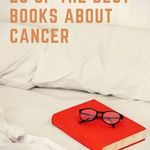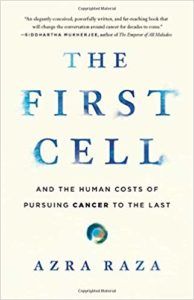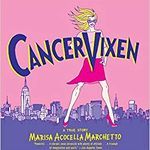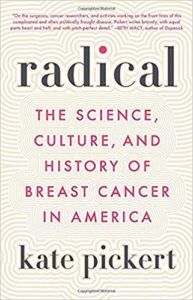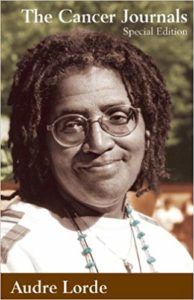The Undying: Pain, Vulnerability, Mortality, Medicine, Art, Time, Dreams, Data, Exhaustion, Cancer, and Care by Anne Boyer
This book…is a powerhouse. I’ve read a lot of cancer memoirs, and I even hesitate to call this a “cancer memoir” because it is so much more than that: it is an indictment of how we see and treat cancer, especially breast cancer. It is a sharp observation of our healthcare system and how it fails when needed most. Boyer, a single mother, was diagnosed with triple-negative breast cancer, a highly aggressive form of the disease. Her writing takes on the pharmaceutical industry, art and illness, capitalism and cancer, and more. I find it hard to describe this book the way I’d like, because it is so layered and so damn smart. I would put it down often as I read, because I had to think through what Boyer wrote.
The First Cell: And the Human Costs of Pursuing Cancer to the Last by Azra Raza
This book is a must-read. It explores the costs of cancer research and treatment—both financial and human, and how despite millions and millions of dollars spent in research and clinical trials, the majority of cancer drugs in the last few decades only minimally extend life, and in a significant percentage, are actually harmful to people. Her compassion for her patients is evident in her writing, and her anecdotes about her work are exquisite and carefully, thoughtfully drawn. She is passionate about her work and the need to reframe cancer research, clinical trials, and patient care, as well as the overhaul that is much needed in oncology.
The Emperor of All Maladies: A Biography of Cancer by Siddhartha Mukherjee
This book is one of my all-time favorites. Mukherjee is a master at writing about complicated things in a way that brings them to life in an interesting way. He can make a single cell the most fascinating thing in the world, and he combines memoir, reportage, and research seamlessly. A Pulitzer Prize winner, this book explores the history of cancer and its treatments, as well as the future of cancer treatment.
Tough: Women Who Survived Cancer edited by Marquina Iliev-Piselli
This is a collection of stories of women with a variety of different cancers. The tone is decidedly positive—yes, there’s honesty in the essays, but it does skew toward the “cancer changed my life and is a gift” kind of story. Some essays are better than others, but overall, this is an interesting book that gives voice to women with a variety of cancers, which is always needed.
Cancer Vixen: A True Story by Marisa Acocella Marchetto
I read this years ago and it has stayed with me ever since. A New Yorker cartoonist, Marchetto depicts her journey of her breast cancer diagnosis and treatment through this graphic novel. Engrossing, well-drawn, and even humorous (she calls her mother her “(s)mother”), I highly recommend this book. Marchetto doesn’t shy away from anything, and this is a refreshing take on the breast cancer memoir.
The Bright Hour: A Memoir of Living and Dying by Nina Riggs
Riggs, a poet/essayist and a descendant of Ralph Waldo Emerson, wrote this quietly beautiful book about her breast cancer, which was published posthumously. At first, it was easily treatable, and a year later, it metastasized. Her observations about living while dying, raising her children while facing her mortality, and how she wants to live in the time she has left are wry and brutally honest. She never becomes sentimental or saccharine, and overall, this is not a depressing read. Riggs actually got in touch with Paul Kalanithi’s widow Lucy, and formed a friendship with her, which eventually led to Riggs’s widow and Lucy falling in love.
The Immortal Life of Henrietta Lacks by Rebecca Skloot
The HeLa cell was the first immortal human cell obtained in a lab. Taken without her knowledge or consent from a poor tobacco farmer named Henrietta Lacks who was being treated for cervical cancer, the cell has become one of the mainstays of scientific research—and yet her family was in poverty. Skloot tells the story of Lacks, as well as race, medicine, and ethics. Read this before seeing the HBO movie. Skloot is a fantastic science writer.
Memoir of a Debulked Woman: Enduring Ovarian Cancer by Susan Gubar
Ovarian cancer is a devastating cancer. It’s often not diagnosed until it’s widespread, because the symptoms are so nonspecific and there’s no good standardized screening tool. We don’t get many stories of women living with or those who have survived ovarian cancer—but this is one of them. Gubar tells her story honestly, describing the radical debulking surgery that was used to help treat her ovarian cancer, and searches for meaning in the only ways she knows how. She examines the way ovarian cancer is treated and how it affects people and their families, and shies away from nothing while telling her story of survivorship.
When Breath Becomes Air by Paul Kalanithi
If you haven’t read this memoir yet, do it soon. Kalanithi was finishing up his neurosurgery training when he was diagnosed with Stage IV lung cancer, and this book is an exploration of what it means to be on both sides of the diagnosis. What happens when a doctor suddenly faces imminent mortality? How do you reframe what is really important in life when you never expected it to end so soon?
Being Mortal: Medicine and What Matters in the End by Atul Gawande
This is not just a book about cancer, but about end-of-life issues and care and the decisions we make in treatment and not treating people and their diseases. He interweaves personal and professional stories with research and science, and brings up the point that when it comes time for death and end-of-life decision making, medical care is often counter-intuitive to what it should be. Treatment and prolonging life above all else, avoiding conversations about the realities of illness and death, and over-treating to the point of impairing quality of life and in some cases, hastening death. As usual, Gawande is spot-on with his brilliant insights and compassionate takes on difficult issues. Highly recommended, along with all of his other books.
Radical: The Science, Culture, and History of Breast Cancer in America by Kate Pickert
This memoir recently came out in October 2019 and it is fabulous. Pickert, a health journalist, was diagnosed with aggressive breast cancer at the age of 35. She details her treatment and the options she had, examines the way we approach screening, prevention, and treatment in America, including the “awareness” and pinkwashing of breast cancer, and the societal aspects of the disease. What I really loved about this book was her exploration of metastatic breast cancer and how it is often ignored by society, activists, awareness, and the breast cancer community.
The Unwinding of the Miracle: A Memoir of Life, Death, and Everything That Comes After by Julie Yip-Williams
This is a hard book to read, but worth it. Yip-Williams was diagnosed with metastatic colon cancer at the age of 37, with two small children. She started a blog, and this book grew out of that blog. She tells it all: the treatment decisions, what the treatments are like, the emotional rollercoaster of her cancer and her knowledge of her imminent death. She writes about being an immigrant from Vietnam and how her grandmother wanted to euthanize her because of her blindness, and how eventually, when she got to the U.S., surgery gave her some sight back. She writes about wanting her husband and girls to enjoy life without her, her fears for them, her anger, and her love. She knows she is dying and never pretends otherwise, but this book isn’t about death; it’s about life.
The Philadelphia Chromosome: A Genetic Mystery, a Lethal Cancer, and the Improbable Invention of a Life-Saving Treatment by Jessica Wapner
The Philadelphia chromosome was discovered in 1959, and in 1990 it was found to be the cause of chronic myeloid leukemia (CML). Wapner details decades of scientific research and practical applications of scientific findings, blending reportage, research, and narrative to make this a compelling read, even if you’re not a scientist.
The Cancer Chronicles: Unlocking Medicine’s Deepest Mystery by George Johnson
For science writer Johnson, cancer was just another story subject—until the woman he loved was diagnosed with metastatic cancer. Johnson decided to learn everything he could about cancer and oncology, and this book is the result. Written in clear prose, this book explores metastasis, mutations, cells, chromosomes, statistics, laboratory studies, clinical treatment, carcinogens, the history of cancer, the future of cancer treatment, and everything you could possibly think of. He examines cancer from multiple viewpoints and disciplines, and the result is one of the most interesting books I’ve read on cancer.
Swimming in a Sea of Death: A Son’s Memoir by David Rieff
This was written by Susan Sontag’s son, and while not explicitly about cancer itself, he explores the last nine months of his mother’s life, from her diagnosis through her death from cancer. If you’re a fan of Sontag’s writing, this book is a tender character exploration of Sontag from a unique point of view—but at the same time, Rieff manages to avoid sentimentality. He creates a picture of a smart, strong woman trying to beat the odds of her disease and living (and dying) on her own terms.
The Middle Place by Kelly Corrigan
Corrigan was in that “middle place” that many Baby Boomers find themselves in: caring for their children and managing their household, while also starting to take care of their parents in some ways. She was a thriving adult but still saw herself as her father’s daughter. She was diagnosed with breast cancer, and shortly after her diagnosis, her father was also diagnosed with prostate cancer—late-stage cancer. This memoir is a beautiful, funny (yes, funny) story about family relationships and taking care of the ones you love.
The End of the Beginning: Cancer, Immunity, and the Future of a Cure by Michael Kinch
Kinch has experience as both a university cancer researcher and a head researcher at a biotech company, and his focus has been the immune system and its role in oncology. This book explores the interplay between the immune system and cancer and its treatment in clear prose that even a non-scientist can understand. The level of detail Kinch goes into is fascinating, and I’m eager to see what comes next with immunotherapy treatments in oncology.
Everything Happens for a Reason: And Other Lies I’ve Loved by Kate Bowler
At the age of 35, Bowler, a professor at Duke Divinity School, is diagnosed with stage IV colon cancer. Her specialty is the study of the prosperity gospel, which sees every good thing as a blessing from G-d, and any bad thing that happens as divine disappointment or disapproval. Her diagnosis, then, throws her into a kind of crisis—she has assumed she can control her life, and has lived with a kind of rugged individualism that assumes that anything can be overcome or achieved if you just work hard enough, are positive enough, or are deserving enough. This book examines what happens when that just isn’t always true.
The Anatomy of Hope: How People Prevail in the Face of Illness by Jerome Groopman
I cannot say enough about this book. The first time I read it, I carried it around with me in my bag for weeks. Don’t let the title mislead you: this is not about false hope. Groopman is not positing that hope is a cure-all; rather, he looks at how hope factors in to illness in a variety of ways, even if it doesn’t look like you think it does.
The Cancer Journals by Audre Lorde
Lorde, a poet, kept a record of her breast cancer journey, and this book is one of my favorites. A mix of memoir, journal entries, and criticism, this is a necessary record of a feminist and LGBTQ experience through breast cancer. The language is gorgeous (with Lorde, this is a given), and this should be required reading for everyone going through cancer, no matter what the kind. Want more cancer books or books about related topics? Check out our post on the best books about medicine.
